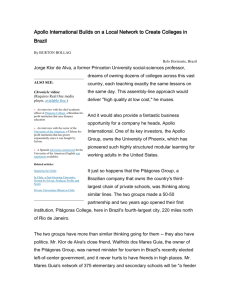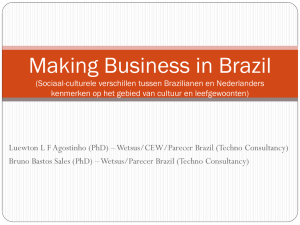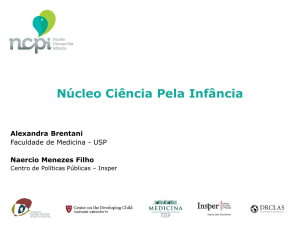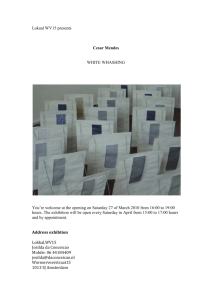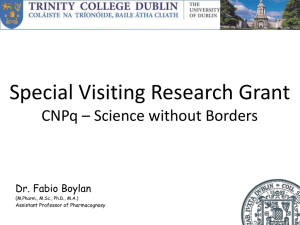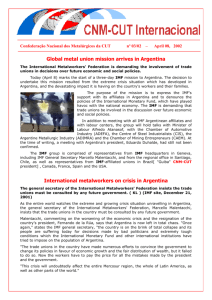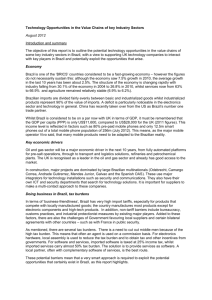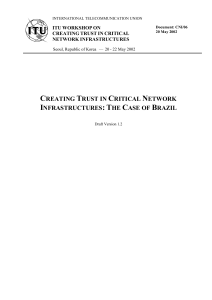International Business
advertisement
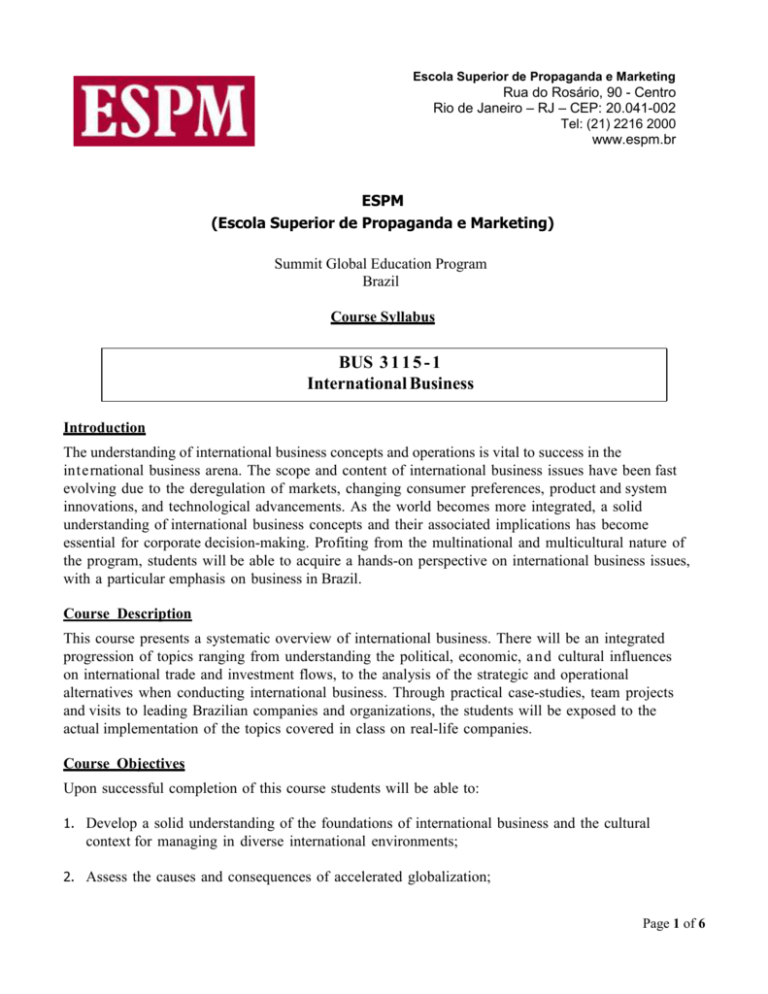
Escola Superior de Propaganda e Marketing Rua do Rosário, 90 - Centro Rio de Janeiro – RJ – CEP: 20.041-002 Tel: (21) 2216 2000 www.espm.br ESPM (Escola Superior de Propaganda e Marketing) Summit Global Education Program Brazil Course Syllabus BUS 3 1 1 5 - 1 International Business Introduction The understanding of international business concepts and operations is vital to success in the international business arena. The scope and content of international business issues have been fast evolving due to the deregulation of markets, changing consumer preferences, product and system innovations, and technological advancements. As the world becomes more integrated, a solid understanding of international business concepts and their associated implications has become essential for corporate decision-making. Profiting from the multinational and multicultural nature of the program, students will be able to acquire a hands-on perspective on international business issues, with a particular emphasis on business in Brazil. Course Description This course presents a systematic overview of international business. There will be an integrated progression of topics ranging from understanding the political, economic, and cultural influences on international trade and investment flows, to the analysis of the strategic and operational alternatives when conducting international business. Through practical case-studies, team projects and visits to leading Brazilian companies and organizations, the students will be exposed to the actual implementation of the topics covered in class on real-life companies. Course Objectives Upon successful completion of this course students will be able to: 1. Develop a solid understanding of the foundations of international business and the cultural context for managing in diverse international environments; 2. Assess the causes and consequences of accelerated globalization; Page 1 of 6 3. Describe the relationship between financial institutions and the global economic crisis; 4. Develop an understanding of the global monetary framework in which international business transactions are conducted and the importance of foreign exchange markets; 5. Implement the strategies and structures that firms adopt in order to compete effectively in the international business arena; 6. Assess the policies and practices of multinational corporations regarding ethics, social responsibility and the environment; 7. Understand the past, present and future of Brazil, and the numerous opportunities it offers for international business. Course Requirements The course requires active student participation. Students are expected to read the assigned textbook chapters, cases and articles before every class. Punctual attendance is required. There will be a midterm exam, a final exam, case studies, and a team project. Each student is required to participate in all professional visits. Teaching Procedures and Methodology Teaching methods used in this course include lectures, case discussions, team assignments, and professional visits. Learning in this course requires the student’s constructive participation and active involvement in both class discussions and small group discussions. Small group discussions, in particular, are a key mechanism for facilitating learning from other team members. Thus, it is essential to attend all group activities inside and outside classes. The corporate visits will expose the participants to different aspects of the class and will highlight the practical relevance of the concepts learned. The visits will be accompanied by individual or group assignments. Required Textbook International Business: Strategy, Management & the New Realities 2nd edition by Tamer Cavusgil, Gary Knight, John Riesenberger [Versions available: Kindle, Hardcover] Prentice Hall, 2011. Recommended Reading Cultural Intelligence: Living and Working Globally, by David Thomas and Kerr Inkson, BerrettKoehler Publishers, 2009 “The New Brazil”, Professor Riordan Roett, Paul H Nitze School of Advanced International Studies at Johns Hopkins University (Director of the Western Hemisphere Studies and Latin American Studies Programs). Brookings Institutional Press; 1st edition (August 2, 2010) Page 2 of 6 Additional Reading Additional articles from a number of sources covering current international business issues will be distributed by the instructor throughout the course Complementary Websites As a requirement of this class, students need be informed about current international, political and economic events. Being informed about what is going on in the world is important to student success in this course and in business. Keeping current of international news will make the class material relevant. This knowledge is integral in evaluating and analyzing course material and ultimately in becoming a competent business professional. For the aforementioned reasons, current events are immersed into class discussions. A partial list of interesting websites that students should consult on a regular basis is provided below: BBC Word News: www.bbc.com The Economist http://www.economist.com Wall Street Journal http://online.wsj.com/public/us Financial Times http://www.ft.com Business Week http://www.businessweek.com Global Edge http://globaledge.msu.edu World Fact Book http://www.cia.gov/cia/publications/factbook Note: Recommendations from students regarding additional websites of interest are encouraged. Team Project This team project is designed to provide you with a sound understanding of how companies that engage in international business apply the concepts discussed in class to make real-life business decisions. Your team assumes the role of consultants that will advise the chosen company on some critical issues related to expanding into a new market. Teams will be made up of 3-4 students each. The project must include the following sections: I. Product and Company Selection Select a product that at least one members of the team has a specific knowledge about and is currently marketed in his/her home country. Describe the product, the manufacturer, and the international business orientation of the firm. II. Market Analysis Looking specifically at opportunities in Brazil, students will select a market in which that product or service is not currently being sold or marketed. You must select a product/country combination for which a profitable business opportunity likely exists. Elaborate a market analysis in which you examine the competitive, economic, and political environment in the context of a SWOT (Strengths/Weaknesses, Opportunities/Threats) that will impact the future success of your product and company there. Focus on the aspects of these environments that are most relevant to your company and product. Page 3 of 6 III. Market Entry Strategy After selecting a product and analyzing the target market, evaluate the different market entry strategies available. Assume that the company does not merely want to export its product to the given market, but has plans to develop a more strategic approach to entering this market. IV. Location As part of your analysis in part III, make sure to suggest one or more particular cities or regions that will play a role in your proposed strategy. Describe the advantages of the proposed locations in terms of operations and distribution among others. V. Internal Capability Building Report Reflect on the capabilities that the chosen company will have to develop or strengthen in order to be successful in the chosen market. Include in the analysis issues related to required management profiles and capabilities and the associated human resources (HR) concerns. The International Business Report 1. Proposal: A brief 1-2 pages (typed, double-spaced, 12 point font) proposal specifying the company/ product/ service and target market selected. Also required is a concise description of your rationale for your decision. Should the initial proposal by the group require significant changes, the revised draft will have to be handed-in within one week of the initial presentation to the instructor. 2. Project updates: Each group has to submit a total of two project updates in order to demonstrate their progress. The instructor will provide timely feedback to ensure that each group is on target. 3. Written Report: The report should be 8-10 pages in length (single-sided, typed, double-spaced, in 11- 12 point font), excluding the cover page, table of contents, list of references, and appendices. In addition to the main content, all written reports must include a cover page, a table of contents, page numbers, a list of current references (minimum of 15), and an appendix of key figures, charts, and the like. References should be written in American Psychological Association (APA) or Harvard Reference format. If you are not familiar with these formats, consult manuals in the library or Internet. 4. Presentation: In the last week of class, each team will hold a 10 minute concise, informative and creative presentation, highlighting the key points of their project report. The required scenario for the presentation is that the group is presenting their plan to potential investors (the audience) for consideration. Creativity is strongly encouraged in all presentations. The team members are required to provide the instructor with regular and frequent updates on the progress of their project. The instructor will consequently provide on-going feedback to each team. Page 4 of 6 Components of Grade Class Participation & Assignments 25% Midterm Exam 20% International Business Project 25% Final Exam 30% Grade Scale A AB+ B BC+ C CD+ D DF 93 - 100% 90 - 92.9% 87 - 89.9% 83 - 86.9% 80 - 82.9% 77 - 79.9% 73 - 76.9% 70 - 72.9% 67 - 69.9% 63 - 66.9% 60 - 62.9% Below 60% Course Outline Module 1: Introduction, key terms and the fundamentals of international business • The mandate for internationalization of firms • The scope and challenge of international business • International business and you: why does it matter? • Dimensions and drivers of market globalization • Economic, social and environmental consequences of globalization • Globalization and International firms: Opportunities and challenges • Sustainability and key environmental issues • International trade theory: the fundamentals of international business • Discussion 1: Debating the Merits of Globalization • Discussion 2: Your professional fit in the global economy Module 2: The Environment of International Business: issues • The cultural environment of International Business • The effect of globalization on culture: are cultures converging? • Types and scope of ethical dilemmas in international business • Corruption and international business: Indicators, legislation and reality • Theories of international trade and investment • Navigating the political and legal minefields in international business • Regional Economic integration: leading blocks, success factors and challenges • Emerging markets and developing economies: a risk-opportunity assessment • The international monetary and financial environment of international business • Discussion: Gaining cultural IQ to compete in the international business arena Page 5 of 6 Module 3: Strategy and Opportunity Assessment Strategy and organization in the international firm Organizational structures for international operations Assessing global market opportunities Global production, outsourcing, and logistics Discussion 1: IKEA’s Global Strategy Discussion 2: Brazil, China and India – Opportunities and Threats Focus Brazil: International business strategies in Brazil • • • • • • • Module 4: Entering and Operating in International Markets • Entry strategies and strategic alliances in international business • Exporting and Countertrade • Licensing, Franchising and other contractual Strategies • Foreign Direct Investment flows and rationale and collaborative ventures • Global Sourcing Module – Regional Business Environment: Brazil • Brazilian trade. Leading trade sectors. Trade sector competitiveness and economic bottlenecks. Trade, development and environment. WTO and regulatory challenges to Brazilian trade. Brazil, Mercosul and regional trade integration. • Brazilian economy and inward capital flows. Public and private financing. Capital flows and exchange rate management. Brazil and the International Monetary System. IMF and G-20. Foreign direct investment in Brazilian economy. Brazilian foreign direct investment. Global productive networks and the Brazilian economy. Challenges: domestic markets, branding and innovation. Brazil and the other emerging economies. • Understanding Brazilian culture: with discussion on regional differences, inequality, poverty, emerging middle class, bureaucracy, corruption, and more. Schedule of Classes and Professional Visits The detailed schedule of classes and professional visits for the session will be available online at www.summitstudyabroad.com. Host University: Founded in 1961, ESPM (Escola Superior de Propaganda e Marketing) established itself as a center of excellence in the teaching of administration, marketing, international relations and communications. It is among the elite few in Brazil to receive the highest grade in evaluation by MEC (the Brazilian Ministry of Education). ESPM has four campuses in Brazil: Sao Paulo, Rio de Janeiro, Porto Alegre and in Brasilia. Today, the school has approximately 10,000 students across various campuses, studying a variety of subjects at the undergraduate and graduate levels, with 600 professors. Academic Integrity ESPM places a high value on the integrity, good conduct and academic honesty of all students. Students are expected to maintain high standards of academic integrity at all times. Any instance of academic dishonesty, including plagiarism, will result in a grade of F for the course. Page 6 of 6
